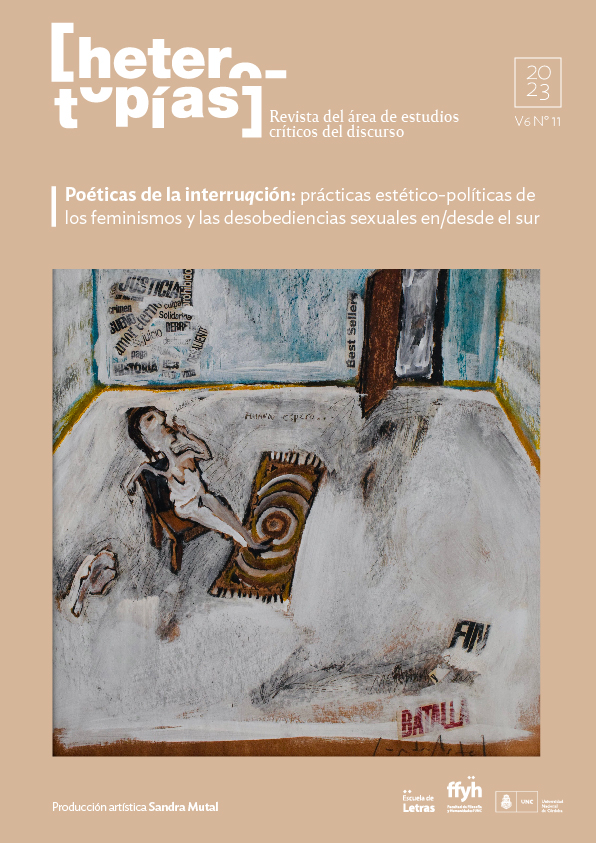Political activims and epistemic resistances
Main Article Content
Abstract
In this essay I propose to establish a dialogue between the notion of epistemic injustice, based on the homonymous work by Miranda Fricker (2007), together with that of activism and epistemic resistance by José Medina (2018). In particular, I suggest a reading of the elements, scope and dimensioning of one of the types of injustice that the author defines as hermeneutical injustice, keyed to understanding that the existing gap in hermeneutical resources not only has negative epistemic consequences on the speaker (such as subject of knowledge), but also a collective hermeneutic impoverishment.
In order to analyze the epistemic, ethical and political problems that it produces, I will now recover the implications and affectations that hermeneutic injustice produces in socially situated contexts. Here I pay attention, on the one hand, to the theoretical considerations of Donna Haraway (1986, 2004),Gloria Anzaldúa (2016) y val flores (2013) to rethink the complex framework that is woven in the epistemological relationship. And on the other, to the discussions impelled from Trans* Studies towards one of the circuits and practices of specific knowledge production such as academics. For this, I will nourish my reflections with the contributions of Blas Radi (2014; 2020), Mauro Cabral (2013), and Shiobhan Guerrero Mc Manus and Leah Muñoz Contreras (2018).
To reflect on this, I built an analytical scaffolding based on: i) the shared epistemic and agency responsibility of the agents, according to the facilitator model; ii) in the opportunities of epistemic resistance to destabilize oppressive normative structures and the complacent cognitive-affective functioning that sustains it and; iii) in the role of epistemic activism in favor of mitigating epistemic injustices -based on the use of certain collective and supportive resources, tools and skills-, promoting new forms of sensitivity and facilitating social justice (Medina, 2018).
Downloads
Article Details

This work is licensed under a Creative Commons Attribution-NonCommercial-ShareAlike 4.0 International License.
Those authors who have publications with this journal, accept the following terms: Those authors who have publications with this journal, accept the following terms:
a. The authors will keep their copyright and guarantee to the journal the right of first publication of their work, which will be simultaneously subject to the Creative Commons Attribution - Non-Commercial - Share Alike (by-nc-sa) Attribution License; no commercial use of the original work or any derivative works is allowed, the distribution of which must be done with a license equal to the one that regulates the original work.
b. Authors may adopt other non-exclusive license agreements for the distribution of the published version of the work (e.g., deposit it in an institutional telematic archive or publish it in a monographic volume) provided that the initial publication in this journal is indicated.
c. Authors are allowed and recommended to disseminate their work through the Internet (e.g. in institutional telematic archives or on their website) before and during the submission process, which may lead to interesting exchanges and increase the number of citations of the published work. (See The effect of open access).
How to Cite
References
Anzaldúa, G. (2016) [1987] Borderlands/La frontera: la nueva mestiza. Traducción de Carmen Valle. Capitán Swing Libros.
Cabral, M. (2013) La Paradoja Transgénero. Recuperado 4 de octubre de 2020, de https://programaddssrr.files.wordpress.com/2013/05/la-paradoja-transgc3a9nero.pdf Fricker, M. (2017) [2007]. Injusticia Epistémica. Ed. Herder. González, V. (2015) Precarización, (in)visibilización y exilio. Una lectura a las ontologías sociocorporales trans desde la perspectiva de Judith Butler [Tesis de Maestría en Ciencias Sociales y Humanidades. UNQ] https://ridaa.unq.edu.ar/handle/20.500.11807/3276. -------- (2021a) Hiatos. Violencia(s), deshumanización e irrealidad [Trabajo final seminario “Género y Violencia”. Programa de Doctorado en Estudios de Género, CEA, UNC] s/e. -------- (2021b) Justicia hipnótica [Trabajo final seminario “Género y Violencia”. Programa de Doctorado en Estudios de Género, CEA - UNC] s/e. -------- (2022, 5 y 6 de mayo) Comunidades de afecto, duelo y política post-mortem [ponencia]. III Jornadas de Jóvenes Investigadorxs en Comunicación. Centro de Investigaciones de Periodismo y Comunicación “Héctor ‘Toto¨ Schmucler. FCS. UNC. flores, v. (2013). “interrupciones”. ensayos de poética activista. escritura, política, pedagogía. Editora La Mondonga Dark.
Guerrero Mc Manus, S. F., & Muñoz Contreras, L. (2018). Epistemologías transfeministas e identidad de género en la infancia. Revista Interdisciplinaria de Estudios de Género de El Colegio de México, 4, 1. https://doi.org/10.24201/eg.v4i0.168
Haraway, D. (1986). Conocimientos situados: la cuestión científica en el feminismo y el privilegio de la perspectiva parcial. En Ciencia, cyborgs y mujeres (pp. 313-346). Ed.Cátedra.
---------- (2004). Testigo_modesto@segundo_milenio. Trad. P. Pitarch. Lectora: revista de dones i textualitat, 10, 13-36.
Medina, J. (2018, en conferencia). La dimensión epistémica de la violencia racial: movimientos sociales y activismo epistémico. PUCP. https://educast.pucp.edu.pe/video/10515/v_jornadas_sobre_teoria_critica__injusticia_epistemica_y_movimientos_sociales
Radi. B. (2020) Epistemología del Asterisco. (s. f.). Recuperado 25 de octubre de 2020, de http://ruge.cin.edu.ar/attachments/article/24/9ee8a_01-Apuntes%20Epistemol%C3%B3gicos.pdf
Pérez, M. y Radi, B. (2014) Diversidad sexo-genérica en el ámbito educativo: Ausencias, presencias y alternativas. 11.
-------- (2016) Privilege. En N. M. Rodriguez, W. J. Martino, J. C. Ingrey, & E. Brockenbrough (Eds.), Critical Concepts in Queer Studies and Education (pp. 219-228). Palgrave Macmillan US. https://doi.org/10.1057/978-1-137-55425-3_22
